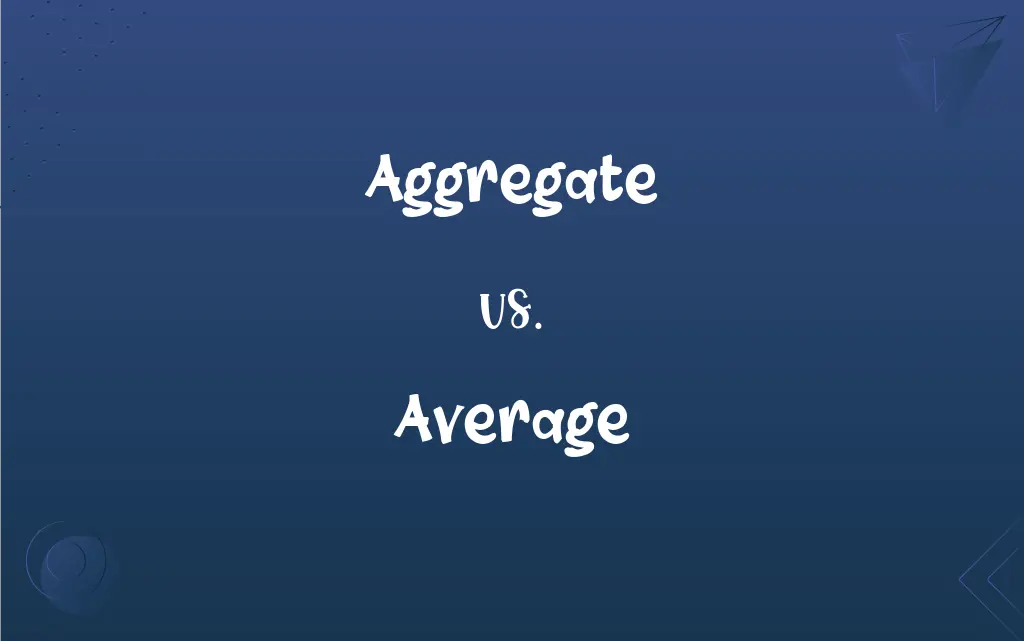Aggregate vs. Average: What's the Difference?
Edited by Harlon Moss || By Janet White || Published on December 9, 2023
Aggregate refers to the total or sum of elements, while average is the value obtained by dividing the sum of a set of elements by the number of elements.

Key Differences
Aggregate emphasizes the total sum of elements in a set. Average, on the other hand, represents a typical value in a set, calculated by dividing the aggregate by the number of elements.
Aggregate shows the collective amount, useful in understanding the total volume or extent. While, average provides an insight into the central tendency or typical value of a data set.
Aggregate is often used to assess total capacity, resources, or value. Whereas, average is employed to understand typical cases or to find a central value for comparative purposes.
Calculating aggregate involves summing all values in a set. Calculating average involves summing values and then dividing by the quantity of elements.
Aggregate reflects the entirety of a set, giving a sense of scale. Average, by abstracting details, provides a simplified, more general understanding of the data.
ADVERTISEMENT
Comparison Chart
Definition
Total sum of elements in a set.
Mean value of elements in a set.
Calculation
Summing all values.
Summing values and dividing by their number.
Purpose
To find the total amount.
To find a representative value.
Reflection of Data
Shows collective volume or extent.
Indicates typical or central tendency.
Usage in Analysis
Assessing total capacity or value.
Understanding common or average scenarios.
ADVERTISEMENT
Aggregate and Average Definitions
Aggregate
A whole formed by combining several elements.
The concrete mix uses different types of aggregate.
Average
The numerical value obtained by dividing the sum of values by their number.
The average score of the class improved this semester.
Aggregate
The sum total of a collection of items.
The aggregate of votes was higher than expected.
Average
Being typical of a certain group.
His performance was average compared to his peers.
Aggregate
Formed by the conjunction of several elements.
The aggregate strength of the team led to their victory.
Average
Representing the typical or usual value.
The average temperature in July is usually around 85°F.
Aggregate
Pertaining to the total or entire sum.
The aggregate effect of the policy was beneficial.
Average
A term used in mathematics to denote a central or typical value in a set of data.
The average of these numbers is surprisingly low.
Aggregate
The process of combining various elements into a whole.
The aggregate income of the group was surprisingly high.
Average
Of moderate or middle quality.
The movie was average, neither great nor terrible.
Aggregate
Constituting or amounting to a whole; total
Aggregate sales in that market.
Average
A number that typifies a set of numbers of which it is a function.
Aggregate
(Botany) Crowded or massed into a dense cluster.
Average
See arithmetic mean.
FAQs
Is aggregate always a large number?
Not necessarily; it depends on the values being summed.
How is average calculated?
By dividing the sum of values by the number of values.
Can aggregate be a material?
Yes, in construction, aggregate refers to a mix of gravel and sand.
What does aggregate mean?
The total sum of individual elements or items.
What does an average tell us?
It indicates a typical or central value in a data set.
Can average be misleading?
Yes, if a data set has extreme values, the average might not be representative.
Does aggregate have a mathematical meaning?
Yes, it refers to the total sum in a mathematical context.
What is a good example of average use?
Calculating the average income of a population.
Is average a specific number?
Yes, it's a specific value calculated from a data set.
Is the median the same as the average?
No, the median is the middle value in a sorted data set.
What's the importance of aggregate in economics?
It helps in understanding the total economic indicators.
Are aggregates used in statistics?
Yes, especially in economic and demographic data.
Can average be used in everyday life?
Yes, like calculating the average expenses per month.
What does a high average indicate?
It suggests that the typical value in the set is high.
Can average be zero?
Yes, if the sum of values is zero.
Is aggregate used in data analysis?
Extensively, especially in large data sets.
Does average apply to non-numeric data?
Typically no, average is used for numeric data.
What's an example of aggregate in sports?
Total points scored in a season by a team.
How do businesses use aggregate data?
To understand total sales, expenses, or customer numbers.
How do you find aggregate in data?
By summing all the individual values in the data set.
About Author
Written by
Janet WhiteJanet White has been an esteemed writer and blogger for Difference Wiki. Holding a Master's degree in Science and Medical Journalism from the prestigious Boston University, she has consistently demonstrated her expertise and passion for her field. When she's not immersed in her work, Janet relishes her time exercising, delving into a good book, and cherishing moments with friends and family.
Edited by
Harlon MossHarlon is a seasoned quality moderator and accomplished content writer for Difference Wiki. An alumnus of the prestigious University of California, he earned his degree in Computer Science. Leveraging his academic background, Harlon brings a meticulous and informed perspective to his work, ensuring content accuracy and excellence.




































































